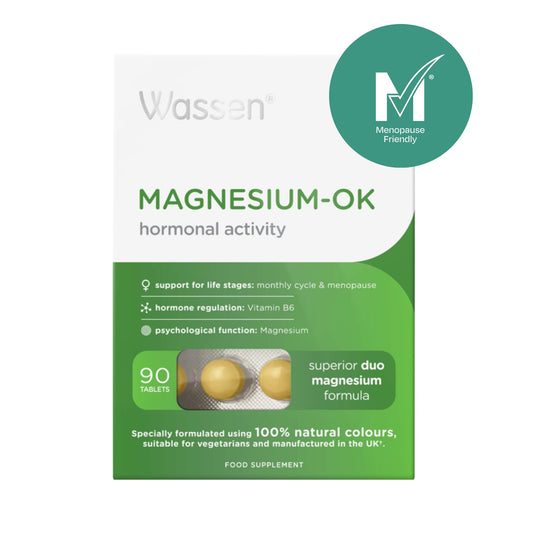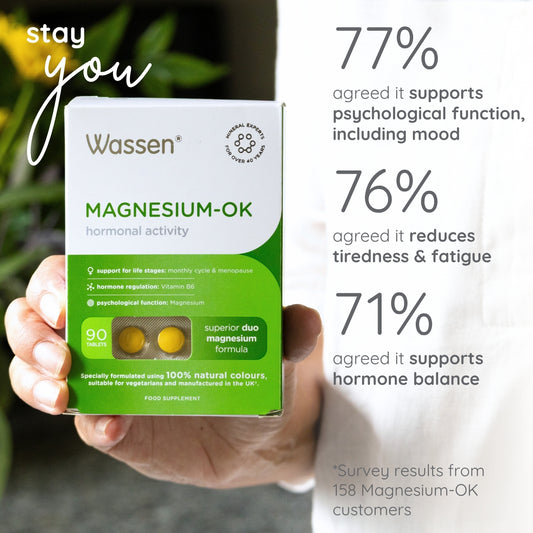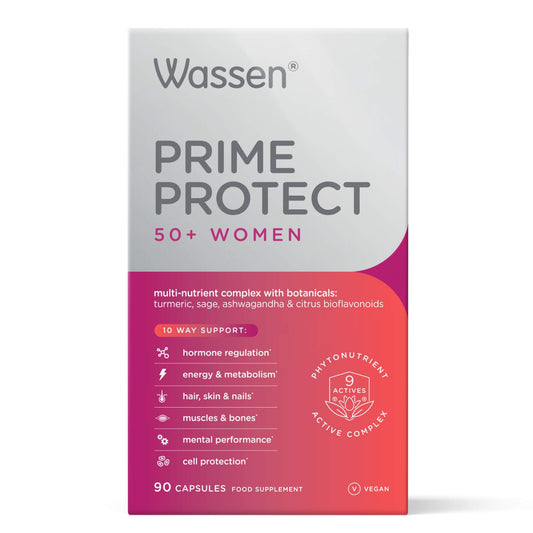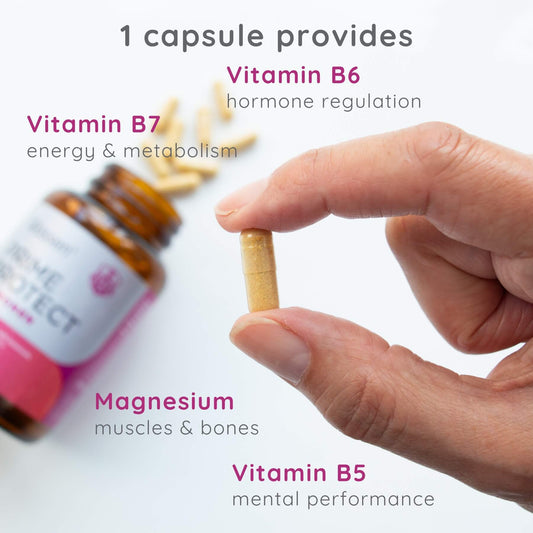Look after your bone health
The drop in oestrogen levels that occurs around the time of menopause results in increased bone loss leading to poorer, less robust bone structure and bone weakness. It is when the bone mass density decreases that bones are easier to break. It is estimated that, on average, women lose up to 10 % of their bone mass in the first five years after menopause. “Women lose about 50% of their trabecular bone and 30% of their cortical bone during the course of their lifetime, about half of which is lost during the first 10 years after the menopause. Approximately 40% of all postmenopausal women will eventually experience fractures.”2
In a study of over 2000 women over pre-peri and post menopause in USA, there was little change in BMD during the pre- or early perimenopausal period. Bone loss accelerated dramatically during late perimenopause and continued through the early post menopause.3
Bone health is a big deal so make sure you are eating enough of the nutrients needed for healthy bones:
Calcium:
It is well known to help make sure that you are eating foods that contain plenty of calcium including a modest amount of dairy products (organic is always best) plus dark green leafy vegetables and potentially fortified soy or nut milk. Calcium helps to reduce the loss of bone mineral in post-menopausal women. Low bone mineral density is a risk factor for osteoporotic bone fractures. Calcium is also vital to help keep bones healthy and plays an important role in the normal functioning of the muscles and neurotransmission – the passing of messages up and down the nervous system.
Vitamin D:
The new advice from PHE (Public Health England) is that adults and children over the age of one should consider taking a daily supplement containing 10mcg of vitamin D, particularly during autumn and winter.4
Magnesium:
Consider taking a supplement with a significant amount of magnesium. Look out for supplements that contain forms of magnesium other than the oxide, magnesium citrate is a great choice for bioavailability. Approximately 300mg is a great amount to aim for. Magnesium is an important mineral that plays a significant part in the maintenance of normal bones. Magnesium also supports normal functioning of muscles and the nervous system – plus energy release and it helps reduce tiredness and fatigue – frankly, we will be having some of that. A great source of magnesium is lightly cooked green vegetables, especially kale, spring cabbage and spinach.
Skin, Hair and Nails may need extra attention:
Oestrogen deficiency following menopause has been linked to atrophic skin changes and acceleration of skin aging. This skin aging due to insufficient oestrogen is shown due to a decrease in defence against oxidative stress which can cause the skin to become thinner with less collagen, decreased elasticity, increased wrinkling, and increased dryness.5
Depressing… so consider taking a supplement with at least 100% NRV of Vitamin C which plays an important role in the formation of collagen, collagen is a vital structural component of skin and cartilage and is a good idea to supplement at this life stage. Zinc is also crucial for the maintenance of normal hair, skin, and nails. Both nutrients also play an important role in keeping the immune system in working order.
Support your hormone balance:
Oestrogen is of course a sex hormone and combined with testosterone and progesterone is responsible for many factors in sexual health. As explained above during this time your hormones are going to change but there are some nutrients that maybe helpful to include in your diet at this lifestage:
Vitamin B6 is crucial for the maintenance of normal hormonal activity and found in foods including chicken, soya beans, oats and bananas. Taking B vitamins in a B complex is a good idea. Vitamins B6, B12 and Folic acid both support normal homocysteine metabolism. Homocysteine is a chemical found in the body naturally, and elevated levels are associated with age related cognitive decline and poor heart health.6
Essential fats – especially Omega 3 and 6 poly unsaturated fats.
Hormones are made from fats (omega 3, 6 - found in nuts, seeds, and oily fish) combined with protein. The government recommends that we eat two portions of fish a week, one oily.
It is vital that the body is well nourished with omega 3 fats at this life stage. The omega 3 fats DHA and EPA help support normal heart function at 250mg a day combined, normal blood triglyceride levels at over 2g intake day and normal blood pressure if you up your intake to over 3g of EPA and DHA a day. Cardiovascular health is an important consideration for maturing women.
In addition to making sure that you eat enough fish, increase your intake of Essential Fats: replace cheese, milk and butter with alternatives e.g. tahini spread, hummus, a flaxseed oil for dipping, add ‘Good Oil’ to salad dressings, top mashed potato with seasoned seeds (Food Doctor Seed Mixes), use unsweetened soya milk or live unsweetened yoghurt on cereals. Silken tofu is useful for creamy sauces or consistencies in soup.
Phytoestrogens
There are some foods that actually contain plant-sourced oestrogens, these are often seen as phytoestrogens in supplements like Red Clover, Soy Isoflavones, Flaxseed Lignans etc. but are also easy to come by through the diet. These “plant hormones” appear to act as weak oestrogens and are found in the following foods: soy beans / kidney beans (can be added to casseroles with no extra preparation needed if tinned), tofu (marinated or stir-fried), organic soya milk, lentils, garlic, seeds (linseed, sesame, pumpkin, sunflower - added to muesli, flapjack or sprinkled on salads), chickpeas (found in houmous).
Stress and Blood sugar balance can also affect your hormone balance.
All hormones are made up of similar building blocks - proteins and fats. These require the help of a range of nutrients for their manufacture and use. There are plenty of different hormones in the body, not just the ones that are defined ‘sex hormones’ i.e. oestrogen, progesterone and testosterone. Adrenaline and cortisol are also well-known hormones that are associated with stress, and insulin is crucial in blood sugar management. If your body is under constant stress or battling blood sugar imbalances, the resources required to keep our sex hormones under control are also needed for dealing with stressful situations and balancing blood sugar. Both of these processes are prioritised by your body – which makes sense because if you can’t deal with a stressful situation or provide the right amount of energy to your body and brain, it is highly unlikely that you will be able to keep your hormones in check at this time of change. Basic dietary strategies to combat this include:
- Eat well, little and often.
- Make sure that you include protein and some fiber within each food choice to slow the release of sugar into the bloodstream reducing chances of a sugar high and subsequent low.
- Book a diary appointment with yourself and just do something for you – a walk, a potter in the local town, a bit of stretching or a nail appointment. Whatever is your thing.
- Exercise is a natural de-stressor but if you are feeling exhausted anyway - go gently, or it can just be another part of your day that is a pressure.
As with any life stage, the menopause is best handled with a focus on good nutrition and a healthy lifestyle. Each woman will experience this life stage differently, and that’s okay. At the very least reflecting on what it means can present a moment – or period of time- to review or even revamp your lifestyle and diet to better look after you. This can only be a good thing?
- Finkelstein J, Brockwell S, Mehta V, Greendale G, Sowers M, Ettinger B, Lo J, Johnston J, Cauley J, Danielson M, Neer R, Bone Mineral Density Changes during the Menopause Transition in a Multiethnic Cohort of Women, The Journal of Clinical Endocrinology & Metabolism, 2008, 93:3, 861–868, https://doi.org/10.1210/jc.2007-1876
- Lo JC, Burnett-Bowie SA, Finkelstein JS, Bone and the Perimenopause, Obstetrics and Gynaecology Clinics of North America, 2011, 38, 3, 503-517, https://doi.org/10.1016/j.ogc.2011.07.001
- NHS - The new guidelines on vitamin D – what you need to know, 2016, accessed 2020, https://www.nhs.uk/news/food-and-diet/the-new-guidelines-on-vitamin-d-what-you-need-to-know/
- Thornton J, Estrogens and aging skin, Dermato-Endocrinology, 2013, 5:2, 264-270, https://www.tandfonline.com/doi/full/10.4161/derm.23872?scroll=top&needAccess=true
- Price B, Wilcock D, Weekman E, Hyperhomocysteinemia as a Risk Factor for Vascular Contributions to Cognitive Impairment and Dementia, Frontiers in Aging Neuroscience, 2018, 10, 350, https://www.frontiersin.org/article/10.3389/fnagi.2018.00350
- Survey conducted by Research by Design in August 2019 with 1000 respondents





